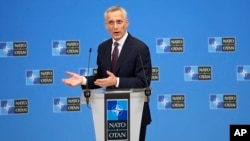Ukraine’s security needs, both immediate and long-term, are expected to dominate the discussion when NATO defense ministers meet Thursday and Friday in Brussels, where Ukrainian Defense Minister Oleksiy Reznikov will brief the participants on the progress of the war.
The most urgent of those needs, Ukrainian Deputy Defense Minister Hanna Maliar told VOA in an interview Wednesday, is ammunition for her country to defend its skies against Russian aerial attacks and to sustain its long-awaited bid to recapture some Russian-held Ukrainian territory that began last week.
Kyiv’s longer-term appeal is for early admission to the 30-nation defensive alliance, a request that is likely to get a more serious hearing when the NATO heads of state meet next month in Vilnius, Lithuania.
This week, the ministers are expected to reassess Ukraine’s military needs, coordinate partnerships and review the alliance's defense capability. The member states are also discussing some measures short of full NATO membership that may be finalized in Brussels.
In her interview, Maliar said Ukrainian forces are moving forward “step by step” in the east and south of the country and have recaptured about 90 square kilometers of territory since the start of the counteroffensive.
But, she said, Russian forces have “increased artillery and mortar shelling, using aviation, making it challenging to advance; there are some difficult weather conditions as well.”
She added that the Russian army is conducting its own offensive operations in some locations, and that Ukrainian forces “are currently in the offensive and defensive stages.”
Maliar confirmed a warning from NATO Secretary-General Jens Stoltenberg, who said in February that Kyiv is burning through shells much more quickly than Western countries can replenish them — a pattern that has accelerated since the start of the counteroffensive.
“Our military is fighting when the enemy has an advantage in weapons. Russia was preparing for this for 30 years; we were fulfilling our international obligation and did disarmament,” she said. “And we need shells. Some days Russians use 70,000 shells per day. The list of our needs we are sharing with our partners regularly.”
Stoltenberg, who visited Washington this week ahead of the Brussels discussions, announced Wednesday a Defense Production Action Plan designed to "rapidly address shortfalls in our stocks."
Reuters has reported that the Brussels meeting will, for the first time, include talks with the heads of some 20 of the world's leading defense companies to find a way to boost the production of what NATO calls "battle-decisive" munitions.
Reznikov told VOA in an exchange of emails that he also expects to discuss plans for the introduction of U.S.-made F-16 jet fighters into the war.
“During the meeting, we will discuss the details of the ‘aircraft coalition’ such as the training of pilots, technicians and engineers who will be engaged in aircraft maintenance because it is a very complex system,” he wrote.
“Subject matters will be discussed with the teams of the defense ministries of the Netherlands, Denmark, the USA, and other countries that have joined this coalition. I included representatives of our Air Force in the Ukrainian delegation. Also, everything related to air defense, ammunition shells, and artillery remains relevant. Our priorities have not changed.”
The longer-term issue of Ukraine’s relationship with NATO figured prominently in Stoltenberg’s meetings in Washington with President Joe Biden and Secretary of State Antony Blinken, according to Ambassador Julianne Smith, the U.S. permanent representative to NATO.
Smith said during a call with journalists on Wednesday that all of the alliance members are “excited about the prospect” of welcoming Ukrainian President Volodymyr Zelenskyy to the summit in Vilnius and that Ukraine's aspirations for NATO membership will be an essential agenda item at the Brussels meeting.
While there is little prospect of a membership invitation while the war continues, Smith said the NATO members are working in real-time on a more limited support package that will “signal new deliverables in the category of enhancing our political relationship with Ukraine.”
“Not just practical support to assist them in their current efforts to defend their territorial integrity, but practical support tied to the longer-term questions, longer term modernization issues they will be grappling with, questions of standardization, and thinking what type of force they will have in the future,” she said.
Smith added that the NATO countries will not be swayed by Russia’s objections to NATO membership for Ukraine.
“Our positions are clear,” she said. “Russia does not have a voice or a veto on NATO’s open-door policy; we support Ukraine’s aspirations to join the Euro Atlantic community.”




